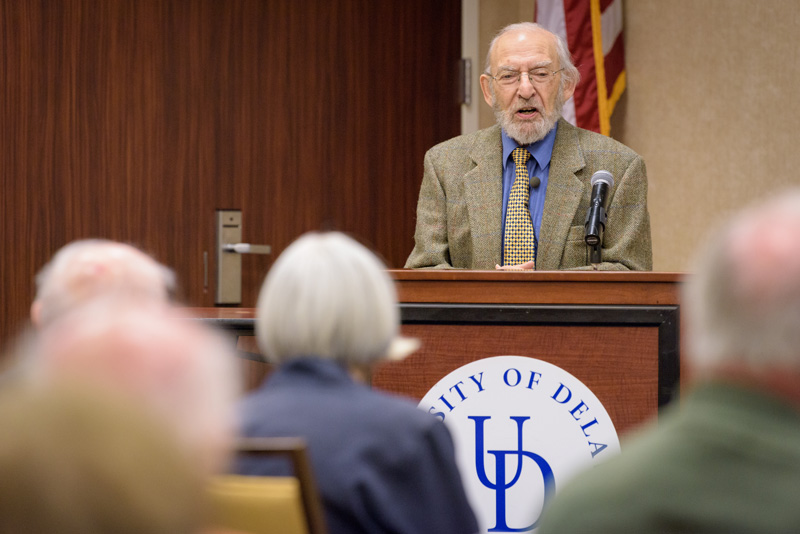


Jay Halio’s intellectual journey
Photo by Evan Krape May 01, 2018
UD professor emeritus shares story of his life and love of teaching
It all started with a class on modern phonology. For two years, Jay Halio analyzed puns found in Shakespeare's plays as his dissertation for his doctorate. He discovered his deep love for language and the playwright’s work. This love, shaped his entire career.
As an example, he highlighted a conversation between Hamlet and his cousin/stepfather Claudius. In the play Hamlet says, “A little more than kin and less than kind.” The play on the words “kin” and “kind” speak to the weird nature of the duo’s relationship and hints at Hamlet’s distrust for Claudius, said Halio, professor emeritus from the University of Delaware’s Department of English.
Halio shared this story as part of his lecture for the UD Association of Retired Faculty’s (UDARF) My Intellectual Journey Series. Each semester, the group invites one of its members to share his or her life story.
Completing the dissertation opened his eyes to the complexity of the English language, Halio said.
“I had to start with the chapter on language and that was quite an intellectual experience,” he said. “It was fascinating to me to look at the history of the English language. How it developed and also how language works and that was the important thing. If I was going to deal with ambiguity, you have to know how language works.”
Halio’s journey started with education. He earned his undergraduate degree from Syracuse University and both his master’s and doctorate from Yale University. He took his first teaching job at the University of California, Davis, where he taught three sections of freshman English.
Throughout the years, Halio took his knowledge around the world. He taught at several international institutions including University of Istanbul, Hebrew University, University of Malaya and University of Nicosia.
Halio found his way to the University of Delaware in 1968 after a friend recommend he fill an opening for a Shakespearean scholar. He said his experience turned out to be more than he could have imagined when he accepted the offer.
While Halio was a full-time professor, he was also very active within the UD community. He served in a number of positions including director of the Jewish studies program, editor of University of Delaware Press and associate provost of instruction.
In the latter role, he said he wanted to move the University’s image forward. At the time, he said he felt there was not enough emphasis on teaching, as UD was known largely as a research institution. He made it his mission to change that.
“I was determined to make teaching as important as research,” Halio said. “It took all six years of my tenure as associate provost and I think I succeeded.”
Even in retirement, Halio continues to be an active part of the community. Each year he takes a group of students on study abroad trips. Additionally, he and his wife Diane Isaacs are generous donors to the University.
The point Halio continuously returned to throughout his lecture was his love of teaching. When he first started teaching, he said, he stuck to the text. As he got more comfortable he began to relate the readings to his life and travels. He found students better enjoyed this approach.
“You really have to love teaching and love your students and that carries forward,” he said.
While teaching at UD, he told his students he would not give any updates on grades until the end of the semester. He said his goal was to make Shakespeare fun and encourage student learning.
“That’s part of my teaching philosophy,” Halio said. “Students, all the time, of course, complain about this.”
One of his favorite projects was to have students act out scenes from the plays they studied in class. He said the most rewarding part was when students discovered how enjoyable the assignment was. In those moments, he said he truly felt like his students were absorbing knowledge.
“It’s more important that [students] learn and get an education” he said.
Contact Us
Have a UDaily story idea?
Contact us at ocm@udel.edu
Members of the press
Contact us at 302-831-NEWS or visit the Media Relations website

